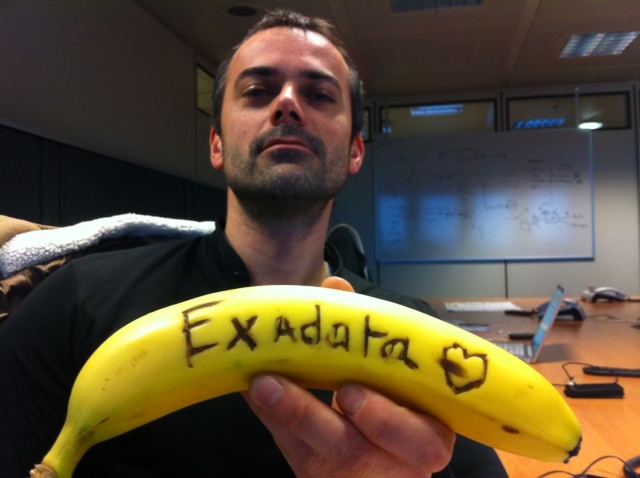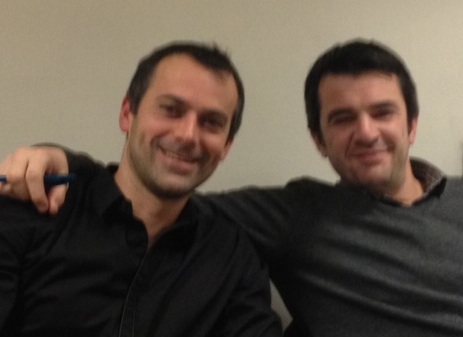January 20, 2013, 10:22 pm
I got a look a new prototype for the next generation Exadata last week while doing some work with a company in Europe. Apparently there is a big push to be environmentally friendly there now and so Oracle is trying to come up with a model that uses less power and is biodegradable. The word on the street is that it won’t be available until after release 2 of the 12c database.
The new model has a few drawbacks though. For one thing, it only lasts a few weeks before you must either replace it or higher some rocket surgeon consultants to come in and tune it. From the early version of the prototype I saw, it does appear to be smaller and more tasty than previous models though.

That’s a picture of the lead designer (JP) showing off the prototype. The code name for the project is “Exanana” by the way. The new model should be available in select supermarkets after lunch (err launch). Here’s another picture of JP and one of the other designers (Paul) hamming it up for the camera.

I probably should have saved this post for April 1st!
January 14, 2013, 7:33 pm
I know no one really likes the term “tuning” these days, but it’s a short catchy word that gets the idea across. So I’ll just stick with it for the title of this post.
Note that this is one of those posts that’s not really supposed to be about how to solve a particular problem. It’s really just a story about a distraction that I ran into and I how I thought about getting around the issue and then ultimately resolving the root cause. Maybe you will find it instructive to see the process.
So I have this script that I use occasionally (paramon.sql) to see what parallel query slaves are doing. Unfortunately the script doesn’t have a header in it, but I’m pretty sure I lifted it from Randolf Geist. I can’t find it on his blog anywhere, but it looks like his style of writing SQL, and PX Query is something he’s written a lot about, so I’m pretty sure that’s where I got it. (Update: see Jonathan Lewis’s comment below attributing the script to Andy Brooker) Anyway, the script has worked great for me in the past but I recently noticed that it was really sluggish on a couple of 11gR2 DB’s running on Exadata. Here’s an example:
-bash-3.2$ !sql
sqlp
SQL*Plus: Release 11.2.0.3.0 Production on Mon Jan 14 12:23:15 2013
Copyright (c) 1982, 2011, Oracle. All rights reserved.
Connected to:
Oracle Database 11g Enterprise Edition Release 11.2.0.3.0 - 64bit Production
With the Partitioning, Real Application Clusters, Automatic Storage Management, OLAP,
Data Mining and Real Application Testing options
INSTANCE_NAME STARTUP_TIME CURRENT_TIME DAYS SECONDS
---------------- -------------------------- -------------------------- ------- ----------
dbm1 09-JAN-2013 03:25 14-JAN-2013 12:23 5.37 464246
SYS@dbm1> set SQLPROMPT "11.2.0.3> "
11.2.0.3>
11.2.0.3> @paramon
Enter value for status:
Node Name Status Pid Sid Parent OSUSER Schema CHILD_WAIT PARENT_WAIT
----- ---- ---------- ----- ----- ------ ------------------------------ ---------- ------------------------------ ------------------------------
P000 AVAILABLE 35
P001 AVAILABLE 36
P002 AVAILABLE 37
P003 AVAILABLE 38
P004 AVAILABLE 39
P005 AVAILABLE 40
P006 AVAILABLE 41
P007 AVAILABLE 42
P008 AVAILABLE 43
P009 AVAILABLE 44
P010 AVAILABLE 45
P011 AVAILABLE 46
P012 AVAILABLE 47
P013 AVAILABLE 48
P014 AVAILABLE 49
P015 AVAILABLE 50
P016 AVAILABLE 51
P017 AVAILABLE 52
P018 AVAILABLE 53
P019 AVAILABLE 54
P020 AVAILABLE 55
P021 AVAILABLE 56
P022 AVAILABLE 57
P023 AVAILABLE 58
P024 AVAILABLE 59
P025 AVAILABLE 60
P026 AVAILABLE 61
P027 AVAILABLE 62
P028 AVAILABLE 63
P029 AVAILABLE 64
P030 AVAILABLE 65
P031 AVAILABLE 66
32 rows selected.
Elapsed: 00:00:23.11
So on this 11g DB it took 23 seconds to run the query. On one of my 10g DB’s though the performance was stellar.
Continue reading ‘Tuning paramon.sql’ »
January 13, 2013, 9:53 am
Just a quick note to let you know I’ll be speaking at the Hotsos Symposium in March in Dallas. I’ve attended every year for the past 6 or 7 years and spoken at several of them. It has consistently been the best performance oriented Oracle conference I’ve attended. This year will be no different with the likes of Maria Colgan, Karen Morton, Tom Kyte, Tim Gorman, Cary Millsap, Frits Hoogland, Gwen Shapira, Alex Gorbachev, Kyle Haily, Carlos Sierra, Kellyn Pot’Vin, Mark Farnham, Toon Koppelaars, Andy Zitelli, Neil Gunther, Stephan Haisley, Marco Gralike, Steven Feuerstein and a host of others. Looks like several of the speakers (including me) plan to be talking about new performance oriented features of the soon to be released Oracle 12c database, so it should be very interesting. One of the best things about the conference is the chance to talk to people (including the speakers) at the breaks. And by the way, while the speaker list is impressive, there are always a large number of highly talented people in attendance that are not speaking. I routinely learn as much from conversations between the sessions as I do listening to the presentations. I highly recommend the symposium to anyone that is interested in Oracle performance. Here’s a link to the main page where you can find the complete list of speakers and their topics and register for the conference.

Hope to see you there!


